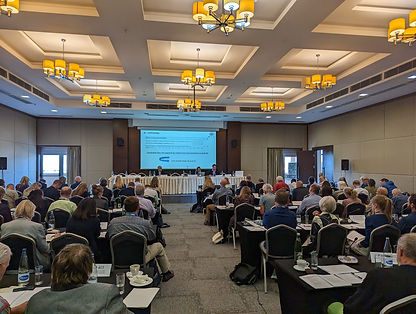
L'experte de CANADEM en Éthiopie: Coordonatrice du cluster santé
~ Dispatches from Herceg Novi ~
Joe Landry writes of his experience as an STO with the OSCE's EOM to the Montenegro Parliamentary Elections 2023
Growing up in Canada and other Western countries there is a tendency to think of abstract concepts like democracy as simply a given - it's just the way that government works. So much so that it even seems trite to assert that people should have the power to choose their leaders, and indeed to remove leaders when the people are no longer satisfied with how things are being run. But in so many parts of the world, the notion of an average person having the power to select their government is completely unheard of, to the point where it would be considered naive to think such a system would even be possible.
The concept of democracy is--by all measures--a noble one, but the reality for most people in democratic countries is that we hardly grasp that it is still a system run by fallible humans and not something that is somehow handed down fully intact from a higher authority without any fault. Rather, it is far from a panacea and relies on a high degree of social trust and well-functioning institutions to actually work. When you start to drill down into what it actually means to have people pick their leaders in practice things start to get a lot messier than one may envision when learning about government and politics in school.
To be honest, until my time volunteering as an election observer in Montenegro with the OSCE, facilitated, placed, and funded by CANADEM, even I, as someone who described himself as “political junkie” and who spent nearly a decade studying politics in university, really understood what an election looked like close up. To be sure, I have always voted since the age of 18, and the power shifts and political intrigue that resulted from elections garnered my interest. However I can’t say that I thought much about where the ballots came from, where they went after they were marked and collected, how the system of checks and balances operates to ensure the tallies and results are correct, or why the procedures are the way that they are.

Having the opportunity to go to Montenegro to see how democracy works in reality, up close, and in person was such an eye-opening experience and it rekindled the excitement that I had when first learning about democratic politics. I was fortunate to be selected as an observer of the June 2023 Parliamentary elections. This was an incredible opportunity as I had previously visited the country on a short trip while on holiday in the region, but had left wanting to see and understand more about this fascinating nation with an at times tumultuous history at the intersection between the Western and Eastern worlds.
It was an especially exciting assignment as Montenegro only recently underwent its first major change in governing party since becoming an independent state in 2006. Up until March 2023 the country had been governed by a single party, and with the election of a new president the interest in political developments across the country had skyrocketed. In the Parliamentary elections I was part of the OSCE monitoring team and a plethora of 15 different political parties were on the ballot. To our surprise, the excitement for this particular election however was muted as the presidential election is perceived as more important than the parliamentary elections.
Still, Montenegrans were choosing their country’s future direction for the years to come, with the major fault line falling between closer ties with Europe with the end goal of joining the EU, versus a return to the perceived status quo of being closer to the Serbian and Russian spheres of influence. As OSCE observers, we are 100% impartial and at no time will express any opinion on the election itself. We also do not opine upon any procedural faults or mistakes observed, but rather simply document them thoroughly.

My area of observation was the seaside town of Herceg Novi, and my team visited more than ten polling stations that day. It was very interesting to see people from all walks of life participating in the democratic process with enthusiasm and vigour. Although the conversations were in a language I could not understand, I could tell that the debates and conversations around who was best to lead the nation were heated while at the same time conducted with a respectful undertone and even jovial nature.
Seeing how fortunate the people felt to be able to cast their votes and enact real, tangible change made me reflect on the democratic processes we take for granted in Canada. It is a privilege that billions of people are unable to avail themselves, and one that millions have fought for over the past few centuries. Taking all of the sights and sounds of democracy in action into account, in a country which was previously under dictatorship for decades prior, was an eye-opening experience that will not soon be forgotten by myself or others on the mission. For this reason I would encourage anyone thinking of applying to CANADEM’s election monitoring program to do so, and to prepare yourself for an experience that is unforgettable. It is truly an honour to provide even a minor service to a cause higher than ourselves, and one that will shape the future of Europe, global politics, and the future of the rules-based international system for the 21st century.


.jpg)
